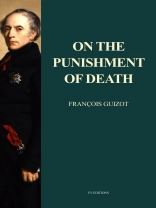It may be asked, perhaps, what I hope from this work? I do not hope, I admit, that governments will be convinced of the inutility of capital punishment, still less that they will abandon its employment. Truth glides slowly into the mind of power, and even when it does fairly enter, it is not immediately acknowledged as master. The mind long refuses to believe, and even when forced to believe, it still refuses to obey. There is no occasion to tell why. It is precisely for this reason, that when power is in error, it is necessary to set the public right-to establish in opinion that which will be so long of resolving into fact. – F. Guizot
François Guizot was a prominent 19th-century French historian, statesman, and thinker. In this treatise from 1822, his analysis is both philosophical and pragmatic, reflecting the debates on the morality and efficacy of the death penalty during his time. His arguments contributed to the broader abolitionist discourse, influencing later thinkers and legislative reforms in Europe.












